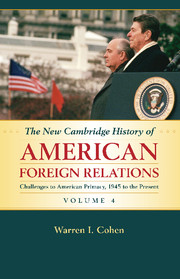Book contents
- The New Cambridge History of American Foreign Relations
- Series page
- The New Cambridge History of American Foreign Relations
- Copyright page
- Dedication
- Contents
- List of Maps
- General Editor’s Introduction
- Acknowledgments
- Part I The Cold War
- Prelude
- 1 At War’s End
- 2 Origins of the Cold War
- 3 The Korean War and Its Consequences
- 4 New Leaders and New Arenas in the Cold War
- 5 Crisis Resolution
- 6 America’s Longest War
- 7 The Rise and Fall of Détente
- 8 In God’s Country
- 9 America and the World, 1945–1991
- Part II After the Cold War
- Bibliographic Essay
- Index
5 - Crisis Resolution
from Part I - The Cold War
Published online by Cambridge University Press: 05 June 2013
- The New Cambridge History of American Foreign Relations
- Series page
- The New Cambridge History of American Foreign Relations
- Copyright page
- Dedication
- Contents
- List of Maps
- General Editor’s Introduction
- Acknowledgments
- Part I The Cold War
- Prelude
- 1 At War’s End
- 2 Origins of the Cold War
- 3 The Korean War and Its Consequences
- 4 New Leaders and New Arenas in the Cold War
- 5 Crisis Resolution
- 6 America’s Longest War
- 7 The Rise and Fall of Détente
- 8 In God’s Country
- 9 America and the World, 1945–1991
- Part II After the Cold War
- Bibliographic Essay
- Index
Summary
- Type
- Chapter
- Information
- The New Cambridge History of American Foreign Relations , pp. 116 - 140Publisher: Cambridge University PressPrint publication year: 2013



